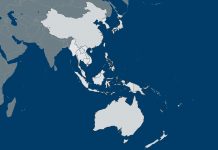By George Friedman
U.S. President Donald Trump and Japanese Prime Minister Shinzo Abe spoke over the phone this past weekend, and if what Abe said is true, they didn’t discuss military action against North Korea. Still, it’s hard to imagine the conversation wasn’t triggered by North Korea’s most recent missile test, considering the missile tested is believed capable of reaching the United States.
Of course, North Korea’s missiles are not yet operational. They still need guidance systems to take them into orbit and to bring them back into the atmosphere without incinerating. They also still need to be armed with a nuclear warhead small and rugged enough to survive re-entry. And though it’s not clear from the flights that have been carried out so far that either of these things exist, neither is it clear that they don’t exist. What is clear, however, is that even without guidance systems, the missiles directly threaten two U.S. allies: Japan and South Korea.
North Korea has been a strategic threat to South Korea for decades – a threat made manifest by extensive artillery emplaced near the border and aimed squarely at Seoul, where nearly half the country’s population lives. The possibility of devastation exists with or without a nuclear weapons program to the north. Such a program would compound the threat Seoul faces, but paradoxically it would also compound the threat Pyongyang faces. If, for example, North Korea attacked South Korea with artillery fire, the United States and Seoul would retaliate with conventional weapons. Nuclear attacks would invite nuclear responses and present the not-insignificant prospect of nuclear fallout in the South.
Because a nuclear attack on the South would imperil the North, the government in Seoul assumes Pyongyang won’t actually strike it with a nuclear weapon. Yet the program still threatens South Korea, albeit indirectly. Its mere existence will likely demand U.S. military action. U.S. military action, in turn, would unleash North Korean artillery on Seoul. Put simply, a U.S. attack on North Korea puts South Korea at greater risk of an attack.
And so South Korea, perhaps more than any other country, wants this particular nuclear crisis to end peacefully. To that end, the government in Seoul will try to dissuade North Korea from threatening the United States. The South Koreans can live with a nuclear North Korea, but they understand what’s at stake: If the North develops a nuclear weapon that can reach the United States, Washington’s interests will supersede their own.
Japan is in a different position. North Korea has never been a conventional military danger to Japan. But nuclear weapons change the equation. Pyongyang would, for the first time, pose an existential threat, one that Japan, by itself, cannot deter.
The Japanese therefore have an interest in the destruction of North Korea’s nuclear capabilities. In fact, North Korea is much closer to Japan’s red line than it is to the United States’. The U.S. line is a functional warhead affixed to an ICBM. The Japanese line – a warhead that can survive a shorter, less rigorous flight on a missile North Korea already has in its arsenal – is closer to being crossed. The United States has some time on its side. Japan doesn’t.
But what can Japan do? On the one hand, Tokyo is in a particularly advantageous situation. The Japanese constitution prohibits military action, so Japan wouldn’t be able to participate in a coalition even if it wanted to. Tokyo could get what it wants at no political cost. On the other hand, Japan is beholden to the United States. The Japanese strategic position since World War II has been to rely on Washington for its national defense. During the Cold War, the Japanese earned their keep by preventing the Soviet fleet from accessing the Pacific Ocean. After the Cold War ended, there was no Soviet fleet for the United States to even be interested in, yet Japan maintained its dependence on the U.S. military. But in the intervening 25 years, there have been no threats to Japanese interests – at least not until now.
Japan’s standard operating procedure is to clearly recognize the threats to it – and to expect the United States to act, since the threat affects Washington as well – but to be unwilling to participate. It even appears disappointed when the United States finds ways to resolve issues diplomatically.
It’s a role Japan has played well, and it’s playing it again with North Korea. The Japanese would be insane not to want North Korean nuclear weapons destroyed. Like the South Koreans, they are more immediately at risk from North Korea’s nuclear weapons program. Unlike the South Koreans, they won’t bear the brunt of an attack. North Korea may or may not be able to strike Japan today, but given the risks, the U.S. should be the most aggressive country of the triad.
With limited options at its disposal, Japan will privately urge the United States to attack early while publicly counseling restraint. This was probably what Trump and Abe’s phone call was about. Trump, for his part, likely concluded that whatever happens will happen at the discretion of the United States, which will ultimately shoulder the responsibility.
South Korea and Japan may be U.S. allies, but they have very different positions, even if the public statements they make downplay those differences. The South Koreans have to oppose an attack, aware that they must live with whatever the U.S. decides. The Japanese will publicly express reluctance and disappointment while privately expressing relief. All this makes it difficult for anything to get done when South Korean and U.S. defense ministers meet, as they are expected to do soon. But the basic reality is that the U.S. alone is capable of acting, and it will decide by itself what it will do.








 The Geopolitics of the American President
The Geopolitics of the American President